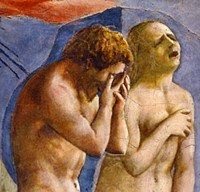Charles Marsh, in his book Strange Glory, contends that Bonhoeffer was celibate, using as evidence a prison letter Bonhoeffer wrote to his best friend, Eberhard Bethge. In this letter, Bonhoeffer notes that he has had more experience of life than Bethge, except for one thing. Marsh interprets that "one thing" as sex. Yet the context of the letter indicates that Bonhoeffer means marriage, not sex itself.
Bonhoeffer's book Creation and Fall, published roughly a decade before the prison letter, however, suggests that Bonhoeffer may indeed have been celibate. This book, based on a series of lectures on Genesis 1-3 that Bonhoeffer gave at the University of Berlin, explores creation, the Fall, and the expulsion from the garden of Eden.
In Creation and Fall, Bonhoeffer pits humans as imago dei, created in the image of God, bound to and guided by the Creator, against sicit deus, humans acting as if they were God. Sicit deus ignores humankind's inherent limits, doesn't depend on God and acts out of its own resources.
For Bonhoeffer, sexuality expresses this post-lapsarian sicit deus or denial of limits. In contrast, the world he imagines in the garden is asexual. Adam, the man, whose point of view Bonhoeffer identifies with and expresses, respects the physical limits of Eve. They can be naked together because Adam will never violate Eve's body.
 |
| "Nakedness is innocence," wrote Bonhoeffer. |
Bonhoeffer expressly identifies the Fall as "the problem of sexuality." (122) For after the Fall, Adam transgresses the boundary and wants to possess Eve's body. This "denies and destroys the creaturely nature of the other person." Thus,"sexuality is a passionate hatred of any limit" (Bonhoeffer's italics). Sexuality "lays violent hands on the other person" and "hates grace." (123)
"Sexuality," Bonhoeffer summarizes, "[is] a perversion of the relation of one human being to another." (125)
This view of sex may startle us in the 21st century. It presupposes a sexuality based on dominance and submission, not mutuality. As with the senior Bonhoeffer's romanticized portrait of their home, it hints that we are entering a different way of seeing. I try to be conscious that I am always viewing Bonhoeffer through a lens slightly blurred by my experience as a person born after the end of World War II.
If Bonhoeffer viewed sex as a problem, as a violation of the Other, does that mean he remained celibate? Did these views change over time?



Very provocative statements, both Bonhoeffer’s and yours.
ReplyDeleteEarlier in Creation and Fall, commenting on Gen. 1:28 (“Be fruitful and multiply”), Bonhoeffer affirms this as a blessing: “But what if this blessing is suddenly changed into a curse?” It seems he attempts to answer his own question in this much later section on “The New [Thing].” Commenting on 3:7 – in other words, POST-Fall – he highlights how sexuality is used for “possessing” the other instead of seeing the limit of the other person as grace and acknowledging this limit in love. Bonhoeffer thus asserts that "sexuality is [has become?] a passionate hatred of every limit, it is arbitrariness to the highest degree, it is self-will, it is avid….” Helpful context for these assertions is found in his comments on 1:26f., at the end of “The Image of God on Earth.” It is worthwhile to re-read his thoughts there on the duality of man, his dominion over the earth, the Fall making man slave instead of ruler, etc.
It is also interesting that Bonhoeffer mentions “UNRESTRAINED sexuality” (emphasis added). And he compares it with “uncreative sexuality.” How does this speak to homosexuality, contraception, pornography, and other issues?
Finally, the place of shame is prominent. “Man’s shame is his reluctant acknowledgement of revelation, of the limit, of the other person, of God. Therefore the preservation of shame in the fallen word is the only – although a most contradictory – possibility of acknowledging the original nakedness and the blessedness [“innocence,” he adds] of this nakedness. This is not because shame is something good in itself…, but because it must give reluctant witness to its own fallen state.” And thus, finally, a look ahead – beyond the Fall – to the restoration of sexuality? - “The SANCTIFICATION of sexuality is given in its restraint by shame, i.e. in its covering and in the vocation of the restrained community of marriage in the Church” (emphasis added).
Eric Andrae
www.LSFPgh.com